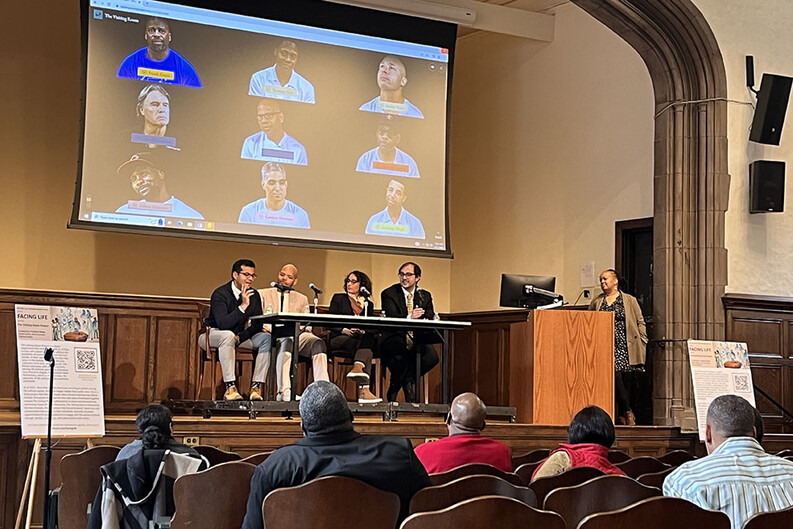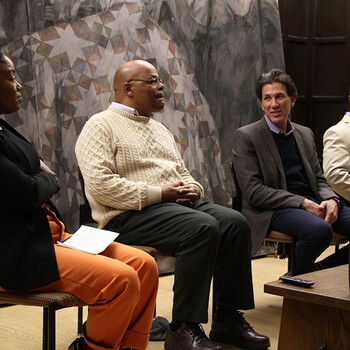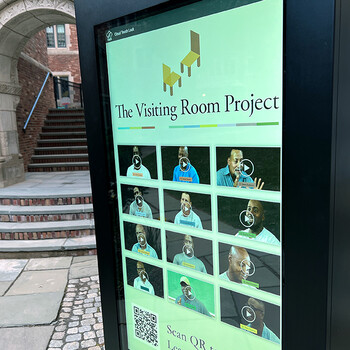“Facing Life” Explores Life Imprisonment and Racial Injustice in Two States

The creators and subjects of a project that captures the human toll of mass incarceration in Louisiana brought their work and experiences to Yale this spring. They were among the panelists of a two-day symposium that also gave voice to people closer to home who have lived through and are working against wrongful prison sentences.
The March 30-31 symposium, Facing Life4, featured panels and discussions on life without parole, mass incarceration, and legal advocacy for incarcerated people. The Law and Racial Justice Center5 at Yale Law School organized the event with co-sponsorship by the Arthur Liman Center for Public Interest Law6, Freedom Reads7, and the Yale University Afro-American Cultural Center8. Screenings and panel discussions took place on the Yale campus and at NXTHVN in New Haven.
The symposium opened with a panel on the Visiting Room Project, a digital experience that invites the public to sit face-to-face with people serving life terms at Louisiana’s Angola Prison and listen to them tell their stories in their own words. Its creators are Loyola-New Orleans Sociology Professor Marcus Kondkar and Calvin Duncan, an exonerated man who spent more than 28 years imprisoned in Louisiana. The project has captured on video more than 100 interviews with individuals facing life at Louisiana’s infamous state penitentiary. For the span of the symposium, visitors could experience the interviews through video displays set up in the Courtyard of Sterling Law Building.
Liman Center Director Jennifer Taylor ’10 moderated another panel, “Mass Incarceration, Racial Injustice, and Opportunities for Relief.” The discussion focused on the impact of race on punishment and on the work to lessen the harms of incarceration in Connecticut and Louisiana. Panelists included Bidish Sarma ’08, Assistant District Attorney in Orleans Parish District Attorney’s Office; Alex Taubes ’15, New Haven-based civil rights lawyer; Gaylord Salters, author and wrongfully convicted New Haven resident; and Miriam Gohara, Clinical Professor and Director of the Jerome N. Frank Legal Services Organization at Yale Law School.

Salters and his brother were convicted in 2002 and 2001, respectively. His brother was exonerated in 2013 after spending 16 years in prison, but it took 20 years before Salters was freed in June 2022. He spoke about how difficult it was each day to wake up in prison when he knew he was innocent. At one point, he realized that people would be receptive to hearing his story through video.
“While I was wrongfully convicted and trying to get out, it just came to a point where I’m trying to get people’s attention ... but when coronavirus hit, it really allowed me an opportunity to get people’s attention [through videos] and through the protests that I organized people were more receptive,” Salters said. “It was a blessing because prior to coronavirus, I wasn’t going to eat. I was going to starve ... Either I’m going to get the nation’s attention or it’s going to be death. So that’s the type of things that you deal with.”
Sarma, who spent most of his legal career as a defense lawyer before joining the civil rights division of the New Orleans District Attorney’s Office, recognized that his role is an unusual — and needed — position on the prosecutorial side. Rather than pursuing conviction at any cost, Sarma is part of a team revisiting old cases in New Orleans to review whether sentences are appropriate and asking a question: did we get the wrong person?
“If we got the wrong person, certainly we want to address that wrong and make sure innocent people aren’t incarcerated,” he said. “That seems like a no-brainer, but that’s a pretty new thing.”
Historically, amidst huge caseloads, poor training, and sometimes ill will, prosecutors did not disclose exculpatory evidence or do so in a timely fashion — even though the U.S. Supreme Court said in 1963 there was a due process duty to do so.
“These are things we know were happening, and we just need to be willing to confront that reality,” Sarma said. “We need to pull the files. We need to read the files, and we just need to be willing to do that.”
Dozens of people interviewed at Angola as part of the Visiting Room Project have since been released from prison, in some cases due to the work of Sarma’s office or other organizations advocating for reviews of cases as well as for second chances. Some of those individuals now work with the project as ambassadors, speaking about their experiences as working to support release for others.

In Connecticut, Taubes has been advocating for sentence modifications and commutations and has had some success. He spoke about the state’s “trial tax,” which occurs when defendants get longer prison sentences for going choosing to go to trial instead of accepting a guilty plea — in essence, being punished for exercising their right to a trial. Taubes explained that, upon request, a judge can modify a sentence to the mandatory minimum, which in Connecticut is 25 years for murder.
“We’ve had a lot of success with judges who see the person who received 100 years or 80 years or 60 years, 25 to 30 years ago,” he said.
Gohara spoke about her work, which includes advocacy in individual cases9 and on larger policy efforts. For many years, the Connecticut Board of Pardons and Paroles was not processing applications for commutations. In 2021, after Gohara and other advocates across the state increased pressure on the parole board to consider those applications — particularly in the midst of the COVID-19 pandemic and the risks facing people in prison — the Board announced a new policy enabling incarcerated individuals to seek sentence review.
“That has been the most successful way for us to get people out of prison,” said Taubes. “My firm has gotten 43 commutations that have taken off 750 years of people’s sentences just since December 2021.”
Gohara and her clinic mobilized advocates of the communtation process10 when political developments threatened its existence in Connecticut this year.
“We need political will if we care about second chances because when politicians or agencies or Department of Correction officials or prosecutors take courageous steps — which we think are the right thing to do — they need support,” said Gohara. “They need support from us or they won't be able to continue to do the work or many of them will cave in. So, I encourage you strongly to reach out to your legislators and support commutation.”
Sarma also stressed the importance of public support.
“In addition to political will, I think getting support from the community matters a lot,” he said. “Having people come forward and say this is what we want our prosecutors to be doing makes a big difference. And I think DA’s are willing to listen to that.”
In response to Taylor’s question about the importance of sharing the stories of the incarcerated, Sarma emphasized that judges and prosecutors are audiences, too.
“People who are in the position of reviewing these cases use Google,” he said. “So, if you Google Anthony Hingle’s name [featured in the Visiting Room], you’re going to find this interview and you’ll have an opportunity to see who this is. And I think that does make a difference in ways that we can’t necessarily see.”
Taubes also stressed that stories can change minds.
“We need to just keep elevating people forward who can change minds and bring new stories forward that people didn’t previously know,” he said. “Just like people in prison can change, people outside of prison change all the time. Their views, their points of view, their attitudes, what they believe in. And it's the stories that do it.”
Salters agreed. He believes a documentary-style video he made and released while incarcerated helped to get him out of prison. He also knows that wrongful convictions continue to happen in New Haven and maintains that “they’re not the product of innocuous mistakes.” Now that he is free, Salters has vowed to help others who have been wrongfully incarcerated.
“This crisis that we have here in New Haven is not a trivial matter. We have people living through continuing wrongful convictions,” he said. “So, for me to step outside and just continue on with my life, I think it would have been kind of selfish,” he said. “So that’s why I do the work that I do … and I will continue to do that work.”


